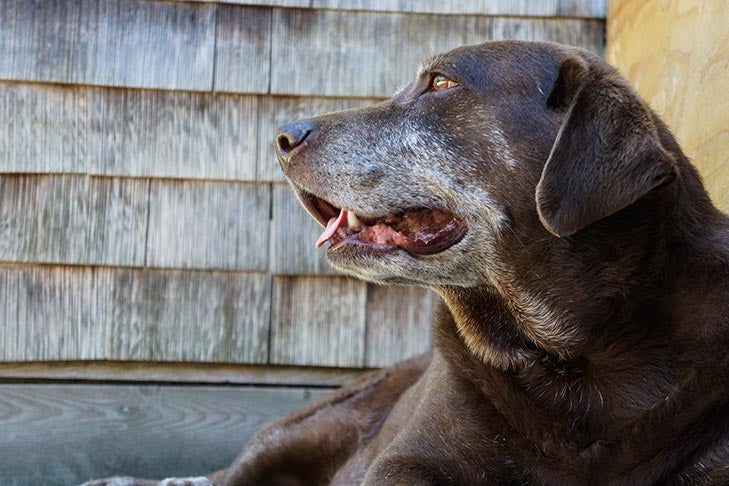
AKC is a participant in affiliate advertising programs designed to provide a means for sites to earn advertising fees by advertising and linking to akc.org. If you purchase a product through this article, we may receive a portion of the sale.
According to the Association for Pet Obesity Prevention, more than half of all dogs are overweight or obese. A dog is considered overweight when their weight is 15% or more above the ideal. Dogs are obese when their weight is 30% or more above the ideal weight for that animal.
Generally, obesity in dogs occurs when there is an imbalance between the amount of energy consumed versus the amount of energy used, although studies show that other factors can also contribute to the problem. Obese dogs tend to be older, female, and spayed. As one might expect, obese dogs tend to receive less exercise than their healthy-weight counterparts.
According to one study, some breeds have shown a predisposition to obesity. The breeds in question include Basset Hounds, Dachshunds, Beagles, Cairn Terriers, West Highland White Terriers, Scottish Terriers, Shetland Sheepdogs, Cavalier King Charles Spaniels, Cocker Spaniels, and Labrador Retrievers. In contrast, the study’s authors note, some breeds, such as the sighthounds, rarely develop obesity.

Dogs that have been spayed or neutered also may have a greater tendency to gain weight, possibly due to the change in metabolism and loss of hormones. It’s important for dog owners to be aware of this possibility and make certain their dogs maintain a healthy weight after surgery.
Age can also be a factor in obesity. As dogs age, their activity level decreases and they lose lean body mass. Dog owners should work with their veterinarians to adjust food intake as the dog ages.
Obesity in Dogs and Health Issues
Unfortunately, obesity can contribute to (or cause) serious health problems in dogs. Among the health problems that are made worse by obesity are:
- High blood pressure
- Osteoarthritis
- Heart disease
- Diabetes
- Respiratory issues
- Orthopedic problems
- Some forms of canine cancer
Obesity has also been shown to contribute to an overall shorter life span for dogs when compared to the lifespan of healthy-weight dogs.
Is My Dog Obese?
Dog owners can access a variety of resources to determine if their pet is obese. Online, they can look for “body condition charts” from responsible sources to get a visual idea of how their dog should be shaped. Generally, dogs with an ideal weight are well-proportioned. You should be able to easily feel their rib bones, spine, and pelvic bones, but they should not be visible or protruding. There should be a visible tuck at their waist.
Of course, the best way to tell if your dog is overweight or obese is for them to receive regular check-ups from their veterinarian. Your dog’s veterinarian is able to determine the animal’s ideal weight and provide you with a plan for reaching that ideal weight if the animal is overweight, obese, or underweight.
Helping Your Dog Lose Weight Safely
Just like with people, it’s important that dog owners have a healthy plan to reduce their dog’s weight if the animal is overweight or obese. They should consult with their veterinarian to determine how to best decrease the animal’s caloric intake and increase exercise and activities.
This is likely to be a long-term project that will be most successful with regular monitoring and adjustments to diet and exercise. Today, there are even foods designed to help dogs lose weight. Again, your veterinarian can help determine the best approach for your dog.

It’s important that exercise programs be started slowly and increased gradually. Walking, playing fetch with a ball, and socializing at dog parks are good, low-impact ways for dogs to increase canine activity levels. You can also try getting involved with AKC FIT DOG, which will get both you and your dog moving. As your dog becomes more used to the activity, you can slowly increase the amount of time you and your dog are doing the activity.
The one thing pet owners want to be sure to avoid is yo-yo dieting. Repeated gaining and losing weight is not healthy for the animal and can lead to other health problems.
An active dog at a healthy weight will be a happier and healthier dog and will likely have a longer life to share with their human family.
This article is intended solely as general guidance, and does not constitute health or other professional advice. Individual situations and applicable laws vary by jurisdiction, and you are encouraged to obtain appropriate advice from qualified professionals in the applicable jurisdictions. We make no representations or warranties concerning any course of action taken by any person following or otherwise using the information offered or provided in this article, including any such information associated with and provided in connection with third-party products, and we will not be liable for any direct, indirect, consequential, special, exemplary or other damages that may result, including but not limited to economic loss, injury, illness or death.

